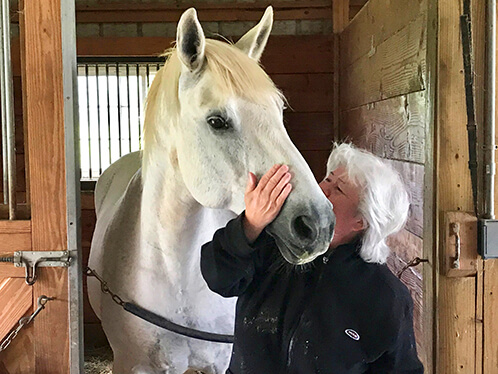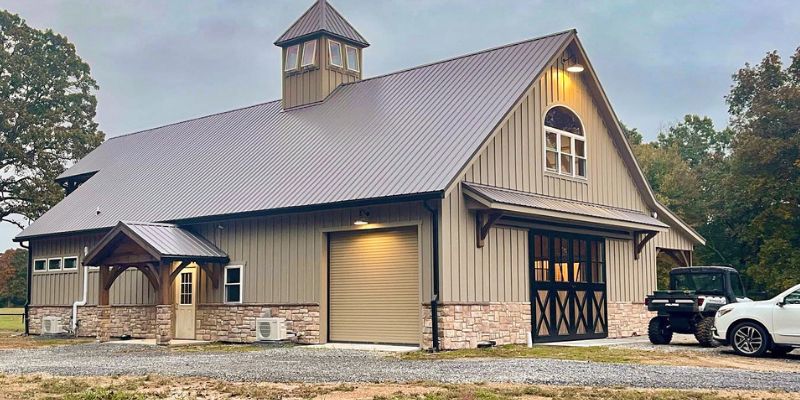Overlooked Farm Practices Can Be Dangerous
Fire safety in the barn often involves common concerns such as moisture content of hay and its storage, providing evacuation plans and emergency services contact numbers, 24/7 illuminated exit signs, smoke alarms, fire extinguishers, removal of cobwebs from light fixtures, no smoking signs, keeping the barn aisle free of obstacles, and all wiring protected from vermin and the reach of inquisitive equine noses.
While putting the above practices into action is a must, there are other fire ‘starters’ that are often overlooked. For example, did you know that arcing of batteries in equipment such as tractors is a leading cause of farm fires? Electrical arcs can reach 10,000 degrees!
Farm buildings are generally considered at higher risk of fire than a residence. This is because where animals are housed the humidity is generally high and there are certain corrosive gases present in the atmosphere such as ammonia and hydrogen sulphate. When electric current is applied in a barn, either on a piece of equipment or through the building’s wiring, they are subject to these negative corrosive forces. Extra safety steps can make all the difference in mitigating the level of fire risk.
Fire Prevention Protocols
- Remove batteries when storing equipment for long periods—especially tractors and larger vehicles. Store batteries in a warm, dry location to extend battery life.
- Empty the hay baler of all hay before putting it away in a building. Hay that sweats up in the baler causes paint damage and rust to the machine and presents a fire hazard.
- Avoid plugging motorized equipment into outlets in the barn or hay storage area. Some examples: electric charged golf carts and diesel engines that require block heaters for cold winter starts.
- Unplug small appliances such as coffee makers and microwave ovens when not in use.
- Ensure all outlets are fitted with GFCI (ground fault circuit interrupter) for additional protection. Install AFCI (arc fault circuit interrupter) where recommended by a licensed electrician. Although annoyingly sensitive to electric current fluctuations AFCI installation can readily detect issues in the circuit before a fire ensues.
- Ensure all breakers and circuits are up to electrical code requirements and the breaker box is easily accessible. Don’t overload circuits. A breaker switching off is your warning that the circuit is not functioning safely.
Electricity 101
As mentioned above barns are at higher risk of fire than homes due to the housing of livestock. Corrosion of copper and brass in wire can produce localized heat that may eventually result in spontaneous ignition of surrounding materials. Corrosion and rodent damage can leave wires exposed that may cause arcing/sparking when an electrical current is applied which results in a fire.
Extension cords that service tank water heaters and electric fences should be protected from damage from snow plowing equipment and heavy tractor tires.
Install steel fire doors in offices, bathrooms, tack rooms etc. Also, automatic door closers can provide a layer of protection for areas at high risk for fire such as feed rooms and barn kitchens and offices. The automatic door closer will help prevent vermin from finding their way inside these spaces and save the need for closing doors by hand when your hands are full.
Never use any open flame in a building. This may seem obvious but sadly rocket heaters stuck at the end of an aisleway, kerosene heaters in feed rooms, and the use of generators in the interior of a building are all too often utilized by farm owners—resulting in fire.
Lightning is more likely to strike a taller building than a diminutive neighbor, and farm structures are often much taller than other buildings on the property. It’s a myth that metal buildings are more likely to be struck by lightning than wood buildings. It’s a good idea to seek professional advice regarding grounding rods and lightning protection for tall buildings in exposed locations. Removal of large trees that may be struck by lightning and fall on the roof of a farm building should be considered as an additional preventative measure.
While accidents happen, taking safety precautions seriously is a solution to minimize the risk of fire. Don’t forget to keep your driveway and access to the barn clear of snow and easily accessible for emergency equipment and your street address clear at the roadside to ensure your property is easy to locate.
One of your best resources for advice is your local fire department. Invite them over to inspect your premises and offer suggestions to improve your fire safety practices. Perhaps at the same time offer their team a lesson in safe handling of horses, and don’t forget a monetary donation if they are a volunteer unit!
About Horizon Structures: One horse or twenty, all horse owners need to provide safe and secure shelter for their equine partners. Horizon Structures combines expert craftsmanship, top-of-the-line materials, and smart “horse-friendly” design to create a full line of sheds and barns that any horse owner can feel confident is the right choice for their horses’ stabling needs. For additional information about the company or their product line visit horizonstructures.com or facebook.com/horizonstructures.
Nikki Alvin-Smith is a seasoned writer/content creator who loves to share her lifelong experience with everything horse, farm, and travel. Her experiences as an international-level Grand Prix dressage competitor, coach, and worldwide clinician provide educational truths and fun moments to share. She and her husband, Paul, live in the beautiful Catskill Mountains of New York and operate an organic hay farm and dressage yard. Visit nikkialvinsmithstudio.com to learn more about her affordable services.
See this article in the March/April 2023 online edition:
March/April 2023

Nikki Alvin-Smith is a seasoned freelance writer who loves to share her lifelong experience with everything horse, farm and travel. Her work has been printed in more than two hundred fifty equestrian magazines worldwide and her published articles number in the thousands including travel and lifestyle press.
A Brit who has called New York home for more than 37 years, Nikki brings a unique perspective to her writing.
Her experience as an international level Grand Prix dressage competitor, coach and worldwide clinician, with a youth spent showjumping and foxhunting, provides lots of educational truths and fun moments to share with the reader. Additionally, she has been a horse breeder and importer of Hanoverian, Dutch and Iberian horses for more than 25 years.
Visit nikkialvinsmithstudio.com to learn more.

